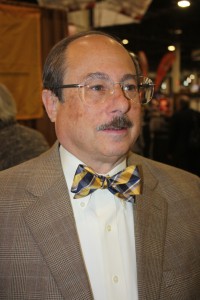By Dave Workman
Senior Editor
As controversy over the Katie Couric gun control documentary “Under the Gun” continues to heat, the Second Amendment Foundation called on the Department of Justice to launch an investigation into possible illegal firearms transactions that apparently involved an unidentified producer associated with the film.
This comes after an interview with director Stephanie Soechtig, recorded a few months ago, surfaced on the Internet. Soechtig discussed the project with Ondi Timoner, host of BYOD, a show dealing with documentaries, that aired on The Lip TV.
It was during that interview that Soechtig revealed, “We sent a producer out and he was from Colorado. He went to Arizona, and he was able to buy a Bushmaster and then three other pistols without a background check in a matter of four hours. And that’s perfectly legal. He wasn’t doing some sort of underground market.”
SAF founder and Executive Vice President Alan M. Gottlieb told TGM he was stunned by that statement. What Soechtig described is not legal at all under existing federal statutes, he noted.
“There can only be two explanations for this,” Gottlieb observed. “Either federal gun laws were violated, or Soechtig made the whole thing up. If the latter is true, then her credibility just went out the window, taking Couric’s along with it.
“If the former is true,” he added, “and the unidentified producer actually did buy the guns, and if he was sent to do that – as Soechtig’s remarks imply – then that’s possible evidence of a criminal conspiracy, or at the very least being an accessory.”
The National Shooting Sports Foundation has also requested an investigation by the Bureau of Alcohol, Tobacco, Firearms and Explosives. NSSF issued the following statement:
“(B)ased on statements made in a videotaped interview, we have to point out that it would appear that a producer of the Katie Couric documentary ‘Under the Gun’ committed at least four federal felonies, one for each firearm he appears to have illegally purchased since the individual was not a resident of Arizona where he purchased the firearms. He may have also violated state criminal statutes.
“And, if Ms. Soechtig, the film’s director, sent him to Arizona to make these firearms purchases,” the statement continued, “as the tape appears to suggest, she may be guilty of engaging in a conspiracy to violate federal firearms laws and/or aiding and abetting the commission of these crimes her producer engaged in.
“We also have to ask what, if any, involvement did Ms. Couric as executive producer have in these purchases,” NSSF wondered. “The NSSF calls upon the Bureau of Alcohol, Tobacco, Forearms and Explosives (ATF) to open a criminal investigation into this important matter.”
According to The Federalist, Soechtig, in response to questions about her statement, said the sales were done to demonstrate “this dangerous loophole…in full compliance with both state and federal laws.”
She acknowledged that “The rifles – including a Smith and Wesson M&P 15, the gun used in the Aurora massacre – were purchased by an out of state resident. The handgun was purchased by an Arizona resident.”
Soechtig reportedly told The Federalist that, “These guns were then turned over to law enforcement and destroyed. They never left the state of Arizona.”
Federal law prohibits interstate private firearm sales. Any transaction or transfer of a firearm between residents of different states must be done through federally-licensed firearms dealers and that typically involves one FFL shipping the gun to a second FFL located in the state of the buyer. No amount of “walking back” the allegation Soechtig made on camera is going to square her or Couric, or the unidentified producer, with existing federal law, Gottlieb said.
“Unfortunately for Couric and Soechtig, their credibility is already in shambles because of the now-infamous eight second silence that never happened between Couric and members of the Virginia Citizen’s Defense League,” he continued.
It was that segment of the program that ignited public debate. VCDL’s Philip Van Cleave made an audio recording of the interchange between Couric and his fellow members. After the program aired on Epix, Van Cleave provided that recording to the media.
“The apparent inability of VCDL members to respond to Couric’s question about background checks was a complete editing fabrication,” Gottlieb said, “and everybody knows it. We don’t consider Couric’s subsequent explanation to be an apology, either. At this point, anything they say is questionable.
“For Soechtig to claim that buying guns in the manner described is legal takes either remarkable audacity or monumental stupidity,” he contended. “The fact that she also used the discredited argument that 40 percent of gun sales happen without background checks adds to the suspicious nature of the production. The only way to sort this out is with a full DOJ investigation, which we think should begin promptly.”




